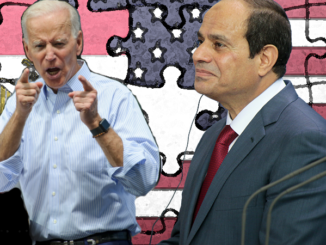
Egypt’s annual military assistance is a test of the US administration’s ability to balance human rights considerations with the American strategic interests. Meanwhile, the Sisi regime is keen to expedite the national dialogue, in attempt to contain international pressures related to human rights abuses.
The end of this month is the deadline for the US administration to inform the Congress of how much military assistance it will send to Egypt, a country with a long track record of jailing dissidents and stifling free speech
In a letter to US Secretary of State Antony Blinken on Tuesday, seven House Democrats led by House Foreign Affairs Committee Chairman Rep. Gregory Meeks urged the administration not to release a portion of Egypt’s assistance if it fails to fully meet the requirements outlined in the annual appropriations legislation.
“As the Biden administration continues to seek to prioritize human rights in our foreign policy following the Trump administration’s woeful abdication of our democratic principles, we call on you to uphold these values — and adhere to the spirit and intent of the law — in our bilateral relationship with Egypt,” they wrote.
Human rights groups say Biden, who as a presidential candidate pledged he would send “no more blank checks” to Egyptian President Abdel Fattah al-Sisi, fell short of expectations last year when his administration released a portion of the security aid that Congress had made contingent on Cairo implementing rights reforms. They’re bracing themselves for a repeat this year.
After Israel, Egypt is the second-largest recipient of US military aid. It receives some $1.3 billion each year, $300 million of which Congress has conditioned on Egypt meeting certain human rights benchmarks. Both the Obama and Trump administrations bypassed those congressionally mandated rights requirements by invoking a legal waiver that allowed them to release the restricted funds on national security grounds.
Biden did not end up using the waiver last year. But his administration did provide Egypt with $170 million of the conditioned $300 million on the condition it be used for border security, counterterrorism and non-proliferation purposes.
The administration blocked the remaining military assistance — $130 million — after the Egyptian government failed to meet a set of human rights-related criteria that included ending a decade-long investigation into civil society groups and releasing or dropping charges against 16 political prisoners.
Rights groups said cutting $130 million — 10% of Egypt’s total military assistance and only a portion of what the law allows for — was woefully insufficient given the North African country’s rights record.
Since Sisi seized power following a 2013 military coup, US officials have been concerned by his government’s sweeping crackdown on the political opposition. The State Department’s annual human rights report details a litany of abuses in Egypt, including unlawful killings, forced disappearances by state security forces, life-threatening prison conditions and the arbitrary detention of political prisoners.
Expediting start of national dialogue
However, five months after the announcement of the national dialogue between the government and the opposition in Egypt, at last it is set to start in the coming weeks, in attempt to contain outside pressures.
Preparations to hold Egypt’s national political dialogue, which Egypt’s Abdel Fattah al-Sisi proposed in April, is now in its final stages after the board of trustees of the national dialogue announced on 11 September the selection of the rapporteurs for its three main tracks and the 15 subcommittees to be discussed during the dialogue’s sessions.
Two prominent members of the board of trustees told Al-Monitor that they expected the official dialogue sessions to be launched at the beginning of October.
The preparations for the dialogue have been ongoing since then.
On June 26, the Egyptian presidency formed the so-called National Dialogue Board of Trustees, which is made up of 19 members, including political figures representing both the government and the opposition.
Since its inception, the board of trustees has held four meetings, during which it laid the foundations and mechanisms of the national dialogue, and identified three political, social and economic tracks to be discussed during the dialogue, with 15 subcommittees.
The board also collected more than 15,000 propositions from political forces, parties and citizens, and received more than 96,000 requests to participate in the dialogue. It also announced during its Sept. 11 meeting the end of the preparation stage and moving toward holding multiple sessions bringing together the forces representing the Egyptian people across the political spectrum.
Kamel Zayed, member of the National Dialogue Board of Trustees representing the pro-opposition Civil Democratic Movement, told Al-Monitor, “We are working to start the actual dialogue sessions in early October, after taking care of some organizational issues.”
Mahmoud Fawzy, head of the Technical Secretariat of the National Dialogue, said the dialogue sessions will be held at the headquarters of the National Training Academy, which is currently tasked with managing the national dialogue.
In televised statements Sept. 6, Fawzy said that a comprehensive report will be prepared on the dialogue outcome to be submitted directly to Sisi, explaining that the president will have the final say on the priority of national action to be implemented.
With the actual holding of the national dialogue fast approaching, the Civil Democratic Movement parties have stepped up their pressure on the government, accusing it of failing to meet the opposition’s conditions to participate in the dialogue, namely the release of political detainees in prisons.
In a statement published on its Facebook page Sept. 7, the movement confirmed “its categorical rejection of the continued arrest of citizens for expressing their opinions, and the restrictions imposed on the public sphere and the media, which contradicts with official claims about moving toward real political reform.”
The movement also rejected the “authorities’ rush to take economic and political measures of strategic nature that affect citizens’ livelihoods and increase the burden of foreign debt and inflation, before the start of the dialogue.”
Zayed, who is also a leader in the Karama (Dignity) party, said, “We called for guarantees for the success of this dialogue, and we stressed that all prisoners of conscience should be released. But things have not greatly changed.”
“Some of the prisoners were released at the time the national dialogue was announced, but it is not enough for us, and we hope the authorities will take the appropriate measures,” he added.
Amr Hashem Rabie, another member of the National Dialogue Board of Trustees, seemed to concur. He told Al-Monitor, “It is not the national dialogue that is progressing slowly, but rather the measures to release those arrested and sentenced.”
In an attempt to contain the opposition, the government announced Sept. 9 the release of a new batch of 33 young men and women who were being held in pretrial detention pending political cases.
Rabie said that social and economic pressures prompted the officials in charge of organizing the national dialogue to speed up the launch of the sessions.
“I think the actual sessions will start in two weeks or 20 days,” Rabie said. “But the success of the national dialogue depends on the government’s seriousness in committing to the dialogue outcomes and recommendations.”
The chairman of the National Dialogue Board of Trustees, Diaa Rashwan, rejected any statements questioning the seriousness and feasibility of the dialogue.
During his “Heliopolis” TV program broadcast on the ETC channel Sept. 2, Rashwan, who is also a journalist, warned that “any attempt to distort this initiative [the national dialogue] will be doomed to failure.”
Meanwhile, Zayed said that is why “the opposition does not want to close the door on dialogue with the government. At the same time it hopes that the state will seriously commit to implementing the dialogue’s recommendations.”
Egypt has suffered greatly in the wake of the Russian war on Ukraine, with the country’s external debt rising to about $157.8 billion at the end of March, according to central bank data released in July. Inflation also rose to a four-year high, driven by an increase in food and beverage prices.
Sisi’s speech Sept. 8 during the inauguration ceremony of the new locally manufactured naval units of the Suez Canal Authority reflected the gravity of the economic crisis and pressure on the country. He called on Egyptians to support his government and not be discouraged. Sisi also assigned his government to hold an economic conference to help solve the crisis.



